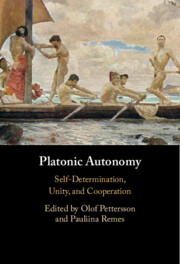Book contents
- Platonic Autonomy
- Platonic Autonomy
- Copyright page
- Contents
- Tables
- Contributors
- Acknowledgements
- Abbreviations
- Introduction
- Part I Self-Determination
- Part II Motivational Challenges to Self-Rule
- Part III Internal and External Authorities
- Chapter 4 Dialectic and Rational Agency
- Chapter 5 Socrates and Conflicting Epistemic Requirements
- Chapter 6 Awakening Autonomy
- Part IV The Limits of Autonomy and Self-Rule
- Part V Reconciling between Freedom, External Authority, and Nature
- Bibliography
- Index
Chapter 6 - Awakening Autonomy
Olympiodorus’ Commentary on Plato’s Gorgias1
from Part III - Internal and External Authorities
Published online by Cambridge University Press: 07 August 2025
- Platonic Autonomy
- Platonic Autonomy
- Copyright page
- Contents
- Tables
- Contributors
- Acknowledgements
- Abbreviations
- Introduction
- Part I Self-Determination
- Part II Motivational Challenges to Self-Rule
- Part III Internal and External Authorities
- Chapter 4 Dialectic and Rational Agency
- Chapter 5 Socrates and Conflicting Epistemic Requirements
- Chapter 6 Awakening Autonomy
- Part IV The Limits of Autonomy and Self-Rule
- Part V Reconciling between Freedom, External Authority, and Nature
- Bibliography
- Index
Summary
This chapter excavates a conception of autonomy from Olympiodorus’ (495–570) commentary on Plato’s Gorgias. For Olympiodorus, the subject of the dialogue is the ethical principles that lead to constitutional happiness, i.e., the well-being of one who exhibits a proper interior ‘constitution’, psychic arrangement or order. Such a person knows himself insofar as he identifies himself with the rational soul and rules himself accordingly. The principal interlocutors in the dialogue falter and stumble primarily because they do not know themselves, and this self-ignorance renders them heteronomic. The present essay therefore detects in Olympiodorus’ commentary an insistence on self-knowledge as the archaeological ground upon which an autonomous human life is based. By reading the pages of the Gorgias, Olympiodorus aspires to draw forth for his students a notion of freedom that is truly human. This chapter attends to Olympiodorus’ commentary with the hope of accomplishing a similar outcome.
Information
- Type
- Chapter
- Information
- Platonic AutonomySelf-Determination, Unity, and Cooperation, pp. 128 - 146Publisher: Cambridge University PressPrint publication year: 2025
Accessibility standard: WCAG 2.1 AA
Why this information is here
This section outlines the accessibility features of this content - including support for screen readers, full keyboard navigation and high-contrast display options. This may not be relevant for you.Accessibility Information
Content Navigation
Allows you to navigate directly to chapters, sections, or non‐text items through a linked table of contents, reducing the need for extensive scrolling.
Provides an interactive index, letting you go straight to where a term or subject appears in the text without manual searching.
Reading Order & Textual Equivalents
You will encounter all content (including footnotes, captions, etc.) in a clear, sequential flow, making it easier to follow with assistive tools like screen readers.
You get concise descriptions (for images, charts, or media clips), ensuring you do not miss crucial information when visual or audio elements are not accessible.
Visual Accessibility
You will still understand key ideas or prompts without relying solely on colour, which is especially helpful if you have colour vision deficiencies.
Structural and Technical Features
You gain clarity from ARIA (Accessible Rich Internet Applications) roles and attributes, as they help assistive technologies interpret how each part of the content functions.
